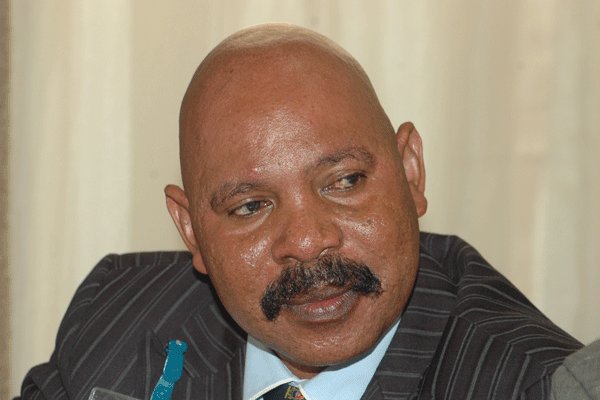Internal Affairs Minister Gen. Jeje Odongo
Uganda Police Force, Uganda Prisons Service, The National Bureau for Non-Government Organizations, National Identification and Registration Authority, Directorate of Citizenship & Immigration Control, Directorate of Government Analytical Laboratories (DGAL) and Ministry of Internal Affairs (MoIA) Headquarters form the key dockets under the Ministry of Internal Affairs.
In addition, for policy guidance, coordination, and strategic leadership, the MoIA Headquarters hosts operational service institutions including The Amnesty Commission (AC), The Directorate of Community Service (NCS), National Focal Point on Small Arms and Light Weapons (NFP/SALWs) & Conflict Early Warning & Response Mechanism, National Coordination Office for Regional Peace & Security Initiatives, Coordination Office for Anti- Human Trafficking and Government Security Office (GSO).
However, the period 2015/16 to 2020/21, the ministry received only 60% of the funding but this didn’t stop the ministry headed by Gen. Jeje Odongo as Minister score highly in as far as NRM manifesto implementation is concerned.
According to Minister Odongo, there was an increase in the production of maize and cotton under the Prisons Service.
In support of local textile industry needs, a total of 11,279 bales of cotton was produced between FY 2016/17 and FY 2020/21. Additionally, Prisons recorded an average of 1,036 MT of quality maize seeds (OPV, hybrid, and foundation seed) produced and processed annually – Germination Rate of 94% and an average of 7,182 MT of maize grain produced annually to support prisoner feeding.
According to the line minister, this was possible after Prisons acquired 36 tractors, 1 Combine harvester, 1 Bulldozer and 1 Grain dryer to mechanize farming practices on Prisons farms.
Other achievements under Prisons are; Recruitment and training of 6,065 warders & wardresses, 129 Cadet Principal Officers and 170 Cadet ASPs.
Recruitment of 154 Cadet ASPs is ongoing; Strengthening the Prisons SACCO and increased membership from 6,874 to 10,271 members representing 94.2% of staff with an asset base of UGX 7.02bn.
There has also been piloting of an irrigation scheme at Bulaula Prison farm to mitigate effects of drought on 150 acres. The scheme has also been rolled out at Bugungu Young Prisoners’ Farm.
Prisons is also producing furniture for Ministries, Departments and Agencies as per the Presidential Directive and a Timber Drying Kiln has been established in a bid to support Government policy on BUBU (Buy Uganda Build Uganda).
Prisons has also completed construction of a 2,000 prisoners’ capacity Mini-Max security prison at Kitalya and construction of 10 low cost prisons has been completed in the following areas; Orom-Tikau, Nebbi, Adjumani, Amita, Mutukula, Ruimi, Sheema, Kyenjojo, Nwoya, & Mutuufu.
As a result of some of these interventions, Odongo says, the Ministry has been able to realize: Reduced escape rate from 13.9 to 5.9 per 1,000 prisoners held in custody, improved welfare of Prison staff and their families, Improved the Staff to Prisoner ratio to 1:7 and increased productivity of prisons farms among others.
DIRECTORATE CITIZENSHIP AND IMMIGRATION CONTROL (DCIC)
Under this directorate, the following has been achieved;
– Fully implemented the e-immigration system which has facilitated the electronic issuance of visas, permits and passes.
– Personalized services of visas can now be accessed at Uganda’s 17 missions.
– EAC e-Passports facility has been operationalized.
– It’s an online application – www.passports.go.ug.
– Passport application, processing, enrollment and issuance have been fully computerized.
– Since its launch, 402,075 citizens have been issued with e-passports.
– Established an automated Border Control Management System under the e-immigration system.
– Installed electronic-gates at Entebbe International Airport for faster clearance of travelers.
– Installed an Automated Border Management system capable of tracking entry and stay of persons in the country.
NATIONAL IDENTIFICATION AND REGISTRATION PERSONS
– To date, a total of 25,372,971 persons are on the National Identification Register representing 62.5% of the total population of the country.
– 15,868,895 National Identification Cards have been issued representing 83% of the population eligible for National Card issuance.
– 6,705,524 pupils and students were fully registered and assigned National Identification Numbers (NINS).
– Integrated NIRA services with the following entities; URSB, DCIC, MoPS, URA, MoES, NSSF, MoLHUD, UCC & EC.
– The infrastructure for implementation of Third Party Interfaces (TPI) has been fully established and functional.
– 60 entities accessed the National Identification Register either through TPI or manually.
– The business processes of the Authority have been reviewed and are being implemented and as a result turnaround time for issuance of cards has reduced considerably. Average turnaround time is 14 days.
DIRECTORATE OF GOVERNMENT ANALYTICAL LABORATORY (DGAL)
During the period under review, DGAL acquired the following:
– Liquid Chromatography Mass Spectrometer machine and A Gas Chromatograph Mass Spectrometer for testing poison
– Genetic Analyzer for DNA analysis,
– Automated Ballistics Information System for Ballistics and Gun analysis,
– Video Spectral Comparator 8000 equipment for Questioned Document analysis and
– Bullet Recovery System to assist in the forensic investigations.
Uganda Police Force (UPF)
The following has been achieved by Police in the last five years;
– Increased police staff strength by 10,000 additional personnel thereby increasing the strength to 52,775 personnel. This has improved police to population ratio from 1:941 to 1:812.
– Built capacity of 11,000 in-service personnel through refresher and specialized training in various disciplines including Executive leadership, Strategic Command and Leadership programs, NCOs Course, advanced training in Criminal Investigations, Forensics, Canine, Marine, Fire, Field Force Unit, Counter Terror, Medical, Air wing, etc.
– Established a Police Senior Command and Staff College at Bwebajja and continued with infrastructural developments in Police Training Schools at Kabalye, Ikafe and Olilim.
– Acquired additional transport and specialized equipment.
This includes growth of the UPF fleet from 9,226 to 11,132 equipment (1,412 General purpose vehicles, 211 specialized vehicles, 19 construction equipment, 9,436 motorcycles, 53 marine vessels, 3 helicopters and 1 fixed wing aircraft). All these equipment have various capabilities for modern day policing.
– Registered a sustained decline in the volume of crime from 257,774 cases reported in 2015 to 195,931 cases reported in 2020. This resulted in a decline in crime rate from 742 to 502 per 100,000 population over the same period.
– Increased the number of Police Districts with Canine services from 50 in FY 2015/16 to 71 in FY 2020/21. Consequently, the number of suspects arrested using canines have increased from 5,508 to 7,203 in the same period
– Increased the number of marines detaches in the country from 18 in FY 2015/16 to 30 in FY 2020/21.
– Intensified road traffic operations throughout the country like Fika salama, use of speed guns and Breathalyzer, operation against drunk driving and errant boda-bodas among others to curb on road indiscipline.
MIA HQTRS
– The Ministry secured the recently concluded 2021 General Elections despite challenges caused by COVID-19 and underfunding.
– The Ministry collaborated with the Ministry of Health and other stakeholders to enforce the SOPs to prevent escalation of the Corona pandemic.
– Strengthened Management of Small Arms and Light Weapons – The Ministry strengthened management and efficient use of small arms and light weapons across all security agencies through finger printing of all state and non – state -owned firearms and enforcement of the COVID- 19 guidelines denied space to wrong elements to commit crime. The Ministry also continued to identify and demolish unexploded ordinances, train and equip officers who guard the armories.
– Enhanced Protection of Vital Installations – Through the Government Security Office, the Ministry continued to coordinate provision of security to vital and strategic public and private sector installations such as satellite, dams, among others. Use of commercial explosives continues to be regulated.
– Improved coordination of anti-human trafficking – The Ministry continued to coordinate the prevention of trafficking in persons, protection of victims and supports prosecution against perpetrators. National awareness campaigns against trafficking in persons were undertaken; over the period 1,646 victims of trafficking were intercepted at various exit points, 209 TIP cases were investigated and 59 convictions were secured.
But with these achievements, other areas have not been achieved. During the period under review, Internal Affairs faced challenges with the changing dimension of crime – especially urban murders, drug and human trafficking, cybercrimes, proliferation of small arms and light weapons, and kidnaps. Others are; Infrastructural challenges: Short fall of staff accommodation, office space, overcrowding of facilities especially in prisons; unresolved border demarcations between Uganda and its neighbors including the porous borders (336 illegal routes that immigrants use to cross into the country); limited coverage and interconnectivity of electronic systems; adequate human resource across the Ministry institutions given the mandate and lack of a business continuity solution/system for all institutions under the Ministry among other challenges.
Gen Odongo says in spite of the challenges the Ministry has faced during the implementation of the NRM Manifesto 2016-2021, they were able to attain 90% of their targeted interventions and that with the new structures that have been put in place, the Ministry should be in a better position to implement the new NRM Manifesto 2021 – 2026.
By Francis Otucu





